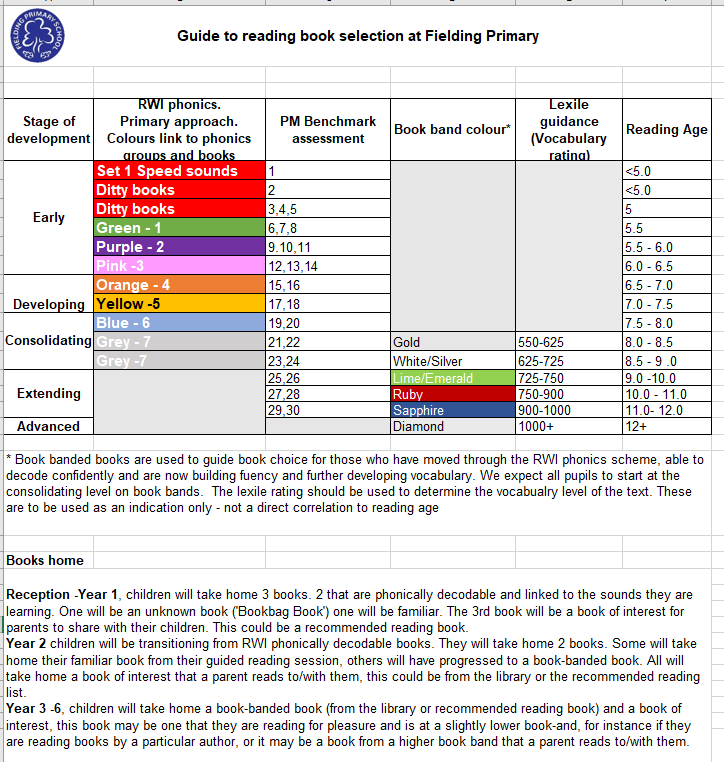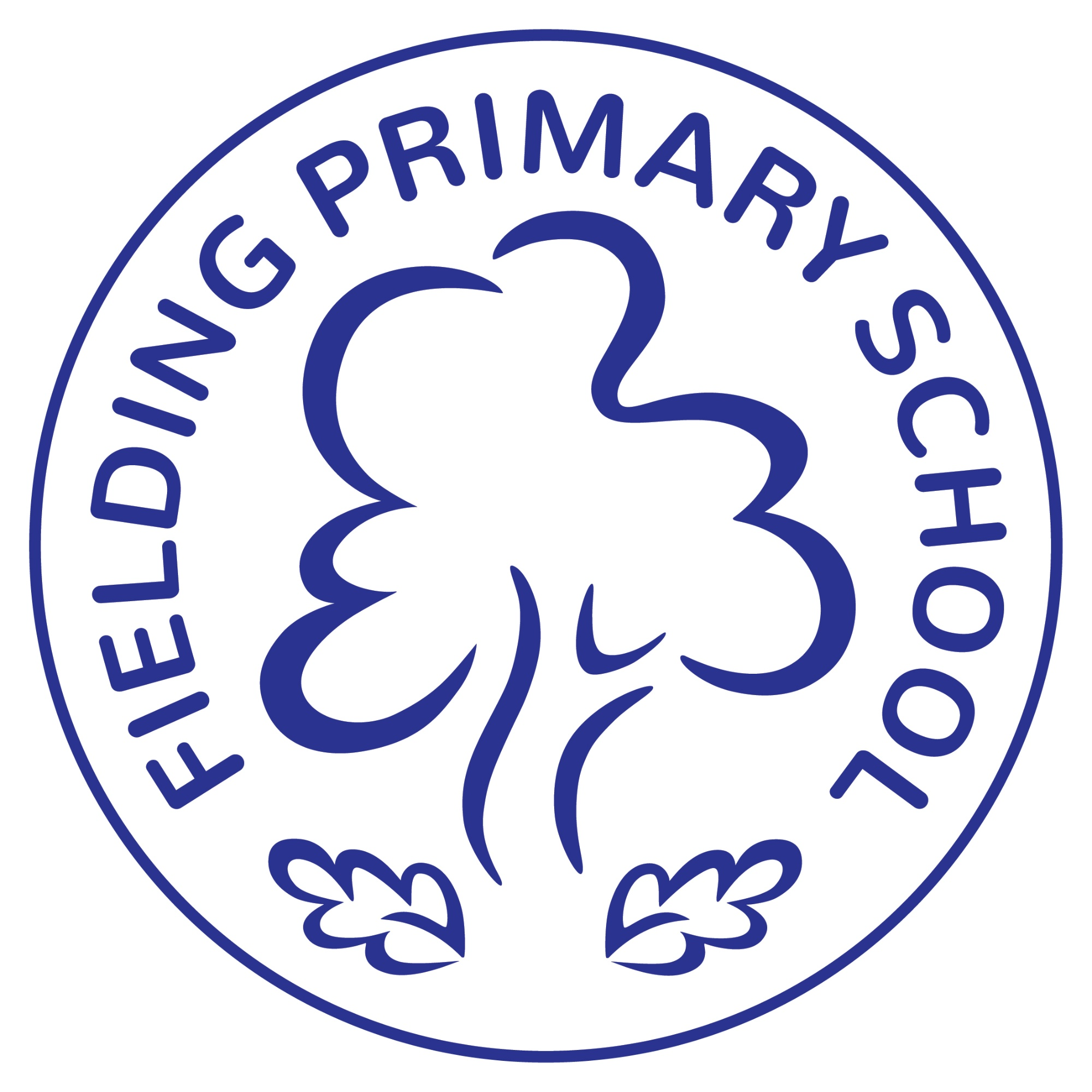English
English is at the heart of our curriculum. It gives pupils the language skills they need to access all areas of learning and express themselves with confidence.
We teach English through:
- Daily English lessons
- Phonics and Reading sessions
- Story Time every day
Speaking and Listening
Speaking and listening are the foundation of learning. If children can say it, they can write it.
Pupils are taught to:
- Speak clearly and confidently in full sentences
- Express ideas and feelings with appropriate tone and vocabulary
- Use discussion and debate skills
- Orally rehearse their writing
These skills support strong communication and lay the groundwork for reading and writing success.
Speaking and Listening Progression Documents
Early Reading and Phonics
At Fielding, we know that strong reading skills are key to success across the curriculum. That’s why we place a strong focus on early reading and phonics.
Our Approach
We use the Read Write Inc. synthetic phonics programme by Ruth Miskin. Phonics is taught systematically, starting in Nursery and continuing through Reception and Year 1.
Children learn to:
- Recognise and write individual sounds (phonemes)
- Blend sounds to read words (e.g. /p/ /o/ /t/ = pot)
- Avoid adding extra sounds (e.g. /puh/ /o/ /tuh/)
As they progress, pupils are introduced to:
- Digraphs (two letters, one sound – e.g. ay in stay)
- Trigraphs (three letters, one sound – e.g. air in fair)
- Visual aids like dots and dashes to support decoding
Phonics Screening Check
In Year 1, all children take the Phonics Screening Check, which includes real and made-up “alien” words to assess decoding skills. This helps teachers and parents understand each child’s progress.
Reading in Practice
- Children read Read Write Inc. books matched to the sounds they’re learning
- Books are read in buddy pairs, during Guided Reading, and sent home for practice
- As decoding becomes secure, pupils move on to a wider range of texts to build comprehension and vocabulary
Our goal is to help children move from learning to read to reading to learn—confidently and early.
�� See our phonics teaching map below for more detail.
Whole Class Reading
Once children are confident with phonics and can decode words, the focus shifts to fluency and comprehension.
- In Year 2 we introduce Whole Class Reading using high-quality, engaging texts.
During these sessions:
- Teachers model fluent reading through Echo Reading, which pupils then imitate.
- Children are explicitly taught new vocabulary.
- Comprehension skills are developed through discussion and questioning.
Fluent readers are better able to understand and enjoy what they read.
Storytime & Book Club
From Nursery to Year 6, every class enjoys a daily Story Time. Pupils listen to a wide range of:
- Stories
- Poems
- Non-fiction texts
These are carefully chosen to:
- Build vocabulary
- Broaden knowledge of the world
- Foster a lifelong love of reading
Pupils in Years 1–6 also attend Book Club in the school library. Books are selected based on:
- Class interests
- Curriculum links
- Authors studied in class
Children may act out stories and borrow books to take home, helping to make reading fun and meaningful.

Recommended Reading Lists
We’ve created recommended reading lists with 50 carefully selected books for each year group. These age-appropriate titles are designed to:
- Spark imagination
- Build a rich vocabulary
- Encourage a love of reading
Each list includes:
- Colour bands to guide reading levels
- Book descriptions to help children choose based on their interests and Lexile level
Children are encouraged to read all 50 books in their year group. As they progress, they earn award certificates to celebrate their achievements.
Reading for pleasure, one book at a time!
Writing at Fielding
At Fielding, we use the I Am A Clever Writer (IAACW) approach to help children become confident, independent writers. This structured programme is used from Year 1 to Year 6 and supports all pupils in developing strong writing skills.
Key Features of IAACW
- Step-by-step teaching: Writing is broken down into manageable parts, helping children understand how to build sentences, paragraphs, and full texts.
- Live marking: Teachers give immediate feedback during lessons, helping pupils correct and improve their work in real time.
- Focus on fluency: Regular practice of spelling, handwriting, and sentence structure helps children write more fluently and accurately.
- Inclusive for all learners: The approach supports children with additional needs, including dyslexia, by reinforcing spelling and handwriting together.
- Self-assessment and reflection: Pupils are encouraged to set goals, review their progress, and take pride in their writing.
By combining clear modelling, consistent routines, and high expectations, IAACW helps children develop the confidence and skills to express themselves clearly and creatively.
✍️ At Fielding, every child is a clever writer.
Spelling at Fielding
From Year 1 onwards, we follow the Read Write Inc. Spelling programme, which builds on the phonics knowledge taught in earlier years.
- Pupils have 3 spelling lessons each week with explicit teaching of spelling rules and patterns.
- Spelling is reinforced through dictation activities and applied in daily writing tasks.
This consistent approach helps children become confident, accurate spellers as they progress through the school.
English policy
Click the link below to be taken to our policy page.
